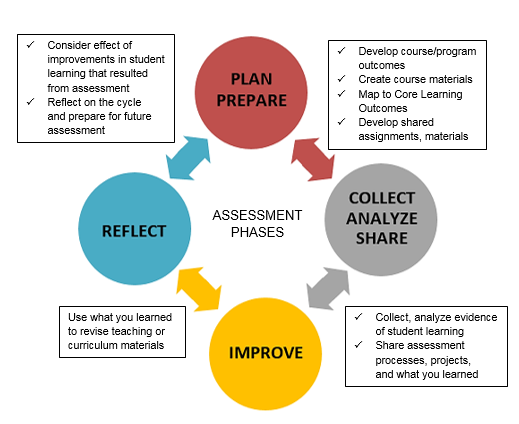Assessment is an ongoing cycle to ensure that courses and programs are doing what
they were designed to do. It starts with preparing for how you will assess, collecting
and sharing evidence, making improvements based on what the evidence shows, and reflect
on if those improvements are making a difference.
Assessments might include exams, papers, reports, presentations, media, projects,
or skills that they must physically demonstrate. Assessment is the activity performed
by students and evaluated or judged by the instructor. Assessment answers the questions: How do I know that my students are learning? What evidence have I observed that my students have achieved the learning outcomes?
Lead instructors and coordinators organize the assessment efforts for each discipline in the English department. they work with
faculty, the Director of Assessment, and the General Education Program Director to
ensure our assessment work is uniform and on track.

Dr. Lauren Webb, the Director of Academic Program Review and Accreditation, provides support to faculty
and departments in the improvement of student learning through academic assessment.
She can collaborate with you to support the development of meaningful student learning
outcomes and ways to measure the attainment of those outcomes for course and program
improvement. Through assessment resources, consultation, and assistance with designing and assessing effective academic programs, she can help
you develop sustainable assessment plans, identify improvements to teaching and learning,
and implement those changes.
Areas for Consultation:
- Workshops for faculty
- Facilitated discussions of assessment results
- Consultations with faculty or committees around assessment, accreditation, or program
review
- Events for faculty and administrators
- The coordination of assessment processes in collaboration with faculty
- Effective assessment practices
Contact Dr. Webb at 401-825-1080 or email at [email protected]
Assessment Information
Why do I need to do assessment as a Professor?
Assessment is an important part of education and teaching: it helps instructors and
the institution determine whether the goals of a course or program have been achieved
or not. Having students demonstrate their mastery and understanding of the subject
matter is vital to the learning process.
Faculty own the curriculum and as such are responsible for courses and their outcomes.
Assessment is part of the work of a faculty member, just like teaching, writing courses,
working on transfer, etc.
Assessment is a requirement of all accredited institutions of higher education. Our
accreditor is the New England Commission of Higher Education (NECHE). Assessment is also required by a program accreditors as well.
How often and how is assessment done?
Assessment can be done at any time during the semester. At the beginning of the semester
is a good time to plan for a course's assessment schedule during the course of the
semester. At the end of the semester, Instructors evaluate how students performed
in the course based on the assessment results.
Will assessment be used criticize my teaching methods and how I am doing as a Professor?
Assessment is not visible to the Instructors who teach the course. It is looking at
the overall student achievement of learning outcomes across many sections of a course.
For example, If there is a course that many students are failing, we would want to
find out why and perhaps adjust pre-requisites. Even the best teachers can only do so much if a course is not structured properly. Our courses and learning
outcomes will be strengthened by this process.
What kinds of assessments do we perform and who leads them?
English Department assessment - led by English department Lead Teachers and Coordinators working with faculty in
the department: Dr. Eileen James - Writing, Professor David Tennant - ALP, Professor Kimberly St. Jean - ELL, Professor Jessica Araujo - Literature, Dina Levitre -Developmemtal Reading adn Writing.
Program assessment - led by Director of Academic Program Review and Accreditation, Dr. Lauren Webb, working with faculty from across all departments
General Education assessment - led by the General Education Program Director, Dr. Leslie Killgore, working with faculty from across all departments
Distance Learning assessment -led by the Executive Director of Online Learning, Michael Marrapodi, working with faculty from across all departments
Groups or initiatives assessment - led by the faculty or staff working in the group. The Faculty Senate assesses how
they are performing and what changes may be needed to improve
Student Learning Outcomes (SLOs) are explicit statements that describe knowledge,
skills, abilities, and attitudes that a student will display upon successful completion
of a course, program, or collegiate experience. SLOs are more than just a memorized
body of knowledge or information. Students are expected to be able to do something
with the knowledge and information that they gain from their learning experiences.
Where do SLOs come from?
Course, program, and general education SLOs are developed by faculty through a collaborative
process within programs. SLOs are put in place through the curriculum development
process.
May an instructor change a SLO on a syllabus?
SLO's cannot be changed without going through the curriculum review process.

